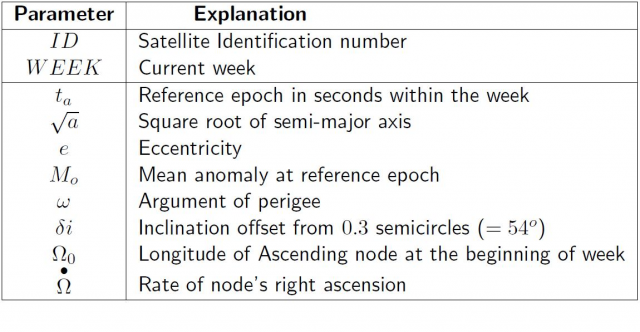If you wish to contribute or participate in the discussions about articles you are invited to contact the Editor
Coordinates Computation from Almanac Data: Difference between revisions
Jump to navigation
Jump to search
Gema.Cueto (talk | contribs) No edit summary |
Gema.Cueto (talk | contribs) (Corrected typo in equation 1: idot is equal to zero and not i.) |
||
| Line 15: | Line 15: | ||
::<math> | ::<math> | ||
\Delta n = i = C_{uc}=C_{us}=C_{rc}=C_{rs}=C_{ic}=C_{is}=0 | \Delta n = \dot{i} = C_{uc}=C_{us}=C_{rc}=C_{rs}=C_{ic}=C_{is}=0 | ||
\qquad \mbox{(1)} | \qquad \mbox{(1)} | ||
</math> | </math> | ||
Revision as of 06:41, 10 May 2022
| Fundamentals | |
|---|---|
| Title | Coordinates Computation from Almanac Data |
| Author(s) | J. Sanz Subirana, J.M. Juan Zornoza and M. Hernández-Pajares, Technical University of Catalonia, Spain. |
| Level | Basic |
| Year of Publication | 2011 |
The almanac data allow to compute a raw estimation of the satellites coordinates (1-2 km [math]\displaystyle{ 1- \sigma }[/math] error), which is needed for signal acquisition by the receiver.
The almanac data consist of a reduced set of parameters (with respect to broadcast ephemeris), as it is shown in table 1 for GPS satellites. Similar data is broadcast for Galileo.
Thence, the same equations as in article GPS and Galileo Satellite Coordinates Computation can be used to compute the coordinates from almanac, just taking:
- [math]\displaystyle{ \Delta n = \dot{i} = C_{uc}=C_{us}=C_{rc}=C_{rs}=C_{ic}=C_{is}=0 \qquad \mbox{(1)} }[/math]
- and
- [math]\displaystyle{ i=54^o+\delta i \qquad \mbox{(GPS satellites).} \qquad \mbox{(2)} }[/math]

